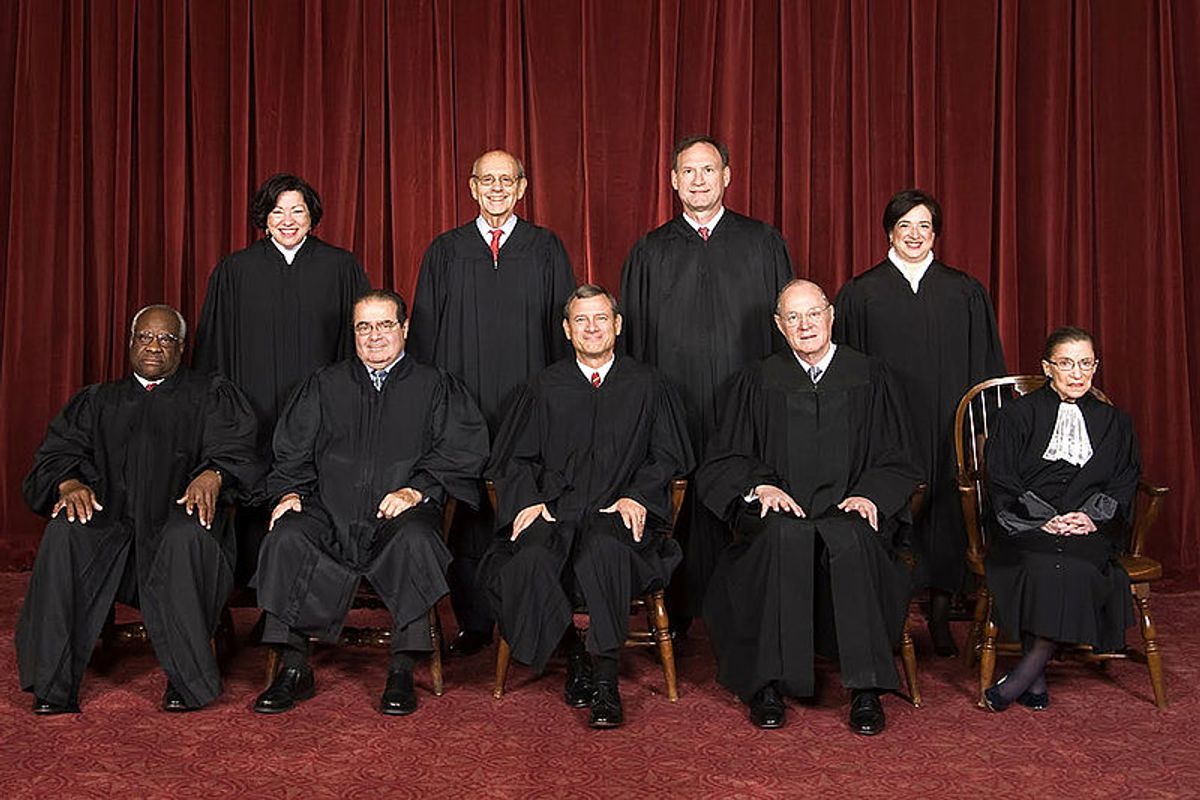 Republican lawyers are asking the U.S. Supreme Court to declare that they have a First Amendment right to lie during political campaigns.
Republican lawyers are asking the U.S. Supreme Court to declare that they have a First Amendment right to lie during political campaigns.
The case concerns a challenge by a national anti-abortion group, Susan B. Anthony List (SBA), which tried to put up a billboard in 2010 attacking Rep. Steven Driehaus, D-Ohio, saying that he was pro-abortion because he supported Obamacare.
The Democratic incumbent stopped the billboard by threatening to sue SBA’s ad agency. He also filed a complaint with the Ohio Elections Commission (OEC) that the ad would have violated a state law making it a crime to knowingly lie in a campaign ad. The OEC found probable cause to procede with a case, which, in turn, prompted a series of court challenges that is now before the Supreme Court and will be heard later this year.
“We are thrilled at the opportunity to have our arguments heard at the Supreme Court and hope that not only will SBA List’s First Amendment rights be affirmed, but those of all Americans,” said Marjorie Dannenfelser, SBA List president. “The Ohio Election Commission statute demonstrates complete disregard for the Constitutional right of citizens to criticize their elected officials.”
American democracy has been dying a death by 1,000 cuts in recent decades as political lawyers have chipped away at the anti-corruption provisions in campaign law. The Supreme Court’s Citizens United decision is a well-known example, opening new ways for the wealthiest Americans—like the Koch brothers—and operators like Karl Rove to secretly funnel hundreds of millions into campaigns, which both did in 2012.
Last fall, the Court heard an appeal brought by an Alabama Republican businessman and the Republican National Committee that is seeking to lift the limit on campaign donations that any individual can give to political parties and so-called non-candidate committees. The case,McCutcheon v. Federal Election Commission, could create another way for wealthy people to donate millions to political campaigns. In general, the worst recent abuses were pioneered by Republicans but have been quickly copied by Democrats.
The SBA List litigation is yet another potential knife in democracy’s back because if the Supreme Court says the SBA has a constitutional right to say anything— overruling state law that require truth in political campaigning—it will surely encourage more lowbrow behavior in elections, as opposed to campaigns based on facts and real debate.
Think of it this way. Under Citizens United and the other federal court rulings that followed, Americans experienced a deluge of negative campaigning by anonymous groups in 2012’s presidential election. Now, the issue before the Supreme Court goes further into the political mud, because it will decide if political ads that are lies are protected as First Amendment political speech.
It’s no accident that the same GOP lawyers and public intellectuals who are now defending lying in political camapigns were last year leading the Republicans’ legal charge against disclusure, or putting one’s name beside one’s convictions in ads.
When there’s no rules or accountability in campaigns, it’s not surprising that the political culture increasingly resembles an extreme sport overrun with blowhards and bullies. One wonders why the GOP lawyers are not arguing that campaigns should be held to factual accuracy while electioneering, or the funders of ad campaigns should be revealed. The answer, of course, is that is not how the GOP sees its path to winning elections.
While it remains to be seen what the Supreme Court will do in the appeal about Ohio’s truth-in-campaigning law, it has been skeptical if not hostile to similar state laws in other cases. It has a fundamentalist inclination toward speech in political campaigns, compared to other areas of First Amendment law where there are restrictions for the public's sake—such as not being free to yell fire in a theatre.
The Court puts political speech on a special pedestal. But there’s great hypocrisy when rules for the court of public opinion differ from the court of legal opinion.
The lawyers who will be arguing for an anti-abortion group’s right to lie in a political campaign could be convicted of a crime—perjury—if they lied while arguing in court. They also would not get far with evidence in a trial if they didn’t identify its source.
But when it comes to electing people who will write laws, these Republican election lawyers now are arguing that it’s fine to lie, just as they have been argining that it’s fine to hide your identity when you pay for negative ad barrages, because that is what the First Amendment protects. This is why American democracy is dying a death by a thousand cuts.

Shares